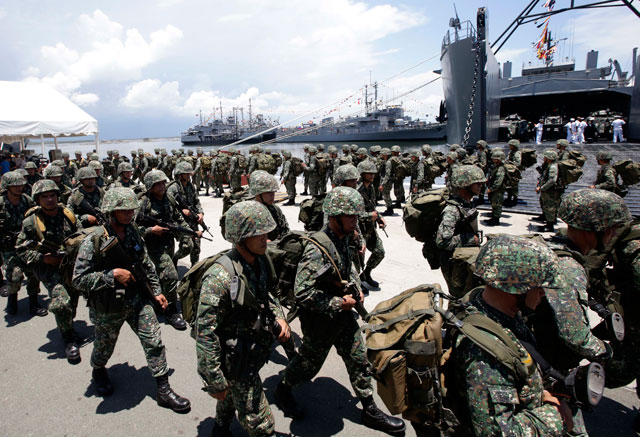SUMMARY
This is AI generated summarization, which may have errors. For context, always refer to the full article.

MANILA, Philippines – Janet “Jenny” Napoles learned the tricks of the trade in the military, where she hobnobbed with generals.
She started small 15 years ago, cutting a deal with the Philippine Marines for the P3.8-million purchase of 500 Kevlar helmets that the Sandiganbayan later found out to be dubious. The court in 2010 punished military officers and civilians who signed the contract.
But Napoles, who encashed the checks from the Marines, got away with it.
In 1998, using her military connections, Napoles committed to deliver 500 Kevlar helmets to the Philippine Marines in exchange for a P3.8-million contract.
She was not a signatory to the deal, however. Instead, she used her mother, brother and sister-in-law to put up dubious companies that participated in a supposed bidding for the supply of the helmets, Sandiganbayan records show.
Her husband, now retired Maj Jaime Napoles of the Marines, was initially charged for failing to investigate the existence of dubious suppliers and his failure to explain the issuance of all 14 checks to his wife. He was however eventually dropped from the case for lack of probable evidence.
Five suppliers participated in the supposed bidding, submitting similar price quotations. The contract was eventually awarded to 7 firms in 1998, only one of which was accredited by the Marines, according to court records. The rest were either non-existent or carried residential addresses.
Given the total amount of the contract — P3.8 million — it required the signature of the Armed Forces chief of staff at the time. To go around the signing threshold, according to the Ombudsman’s case filed with the court, the Marines split the contract into 14 identical purchase orders each amounting to P293,763.56.
Because of the lower amount, the signing authority for the split contracts was confined to the Philippine Marine Corps (PMC) Commandant. At the time, Lt Gen Edgardo Espinosa was the PMC commandant.
Full payment, no delivery
On Jan 7, 1999, without any delivery, the Philippine Marines issued the full payment to the 7 firms for the procurement of 500 Kevlar helmets. All 14 checks were immediately encashed on the same day in Napoles’ Security Bank account in Pasong Tamo Branch, Makati, court records and testimonies showed.
Eight months after Napoles got paid, she was still unable to deliver the helmets, the same records showed. It was only in October 1999, a month after it was discovered not a single helmet had been delivered, that she sent the first batch of helmets. She delivered only 201 units out of the 500 she had committed to produce. She completed the delivery only in December 2000, more than a year later.

To make matters worse, the helmets were not made in the US, as specified by the Marines, but in Taiwan, and were of inferior quality.
The Kevlar scandal forced the filing in August 2001 of malversation charges against officers and civilian suppliers involved in the deal, including Napoles’ mother, brother, sister-in-law, and no less than the commandant of the Marines at the time, Espinosa.
Nine years later, on Oct 28, 2010, the Sandiganbayan’s 4th Division convicted Napoles’ brother, Reynaldo Luy-Lim, and sister-in-law Anna Marie Dulguime, for falsification of public documents, along with other Marines.
Court’s mercy
However, Reynaldo and Anna Marie did not spend a single minute behind bars because they pleaded for probation, telling the anti-graft court they “are not hardened criminals who are beyond redemption.”
They asked the Sandiganbayan’s 4th division, headed by Justice Gregory Ong, to “give them a second chance to maintain their place in society through a process of reformation.”
Arguing they were first-time offenders, they applied for probation, which the court granted on Jan 21, 2013.
Napoles’ mother, named in the charge sheet as Magdalena Luy Francisco, died before the Sandiganbayan handed down its verdict. (In 2008, Napoles put up a foundation, Magdalena Luy-Lim Foundation, in her honor.)
Based on Rappler’s review of court records, among the civilians charged in the case aside from the Napoleses were the following:
- Evelyn de Leon of Emboy Trading
- Reynaldo Francisco of Rejoemex Trading
- Magdalena Francisco of Winlim Trading
- Mia Legacion of Vinnie Trading
- Priscilla Somosot of Atria and Presel Trading
Like pork barrel scheme
Based on the records and interviews with sources, we found out the following:
- Similar to the pork barrel scheme, the case before the Sandiganbayan involved the ghost delivery of helmets, with Napoles as the final recipient of the money. 14 checks issued as payments to 7 supposed winning bidders were all deposited in her Security Bank account.
- Falsified documents were submitted to show proof of deliveries. It was only after the ghost deliveries were found out that Napoles delivered 500 Kevlar helmets in two tranches. Still, they were branded as substandard.
- Owners of the supposed winning firms were apparent dummies of Napoles. Still, the Ombudsman and the Sandiganbayan were apparently clueless about the ties of Napoles with the alleged civilian suppliers. The court decision made no mention of the fact that Reynaldo Francisco, Magdalena Francisco and Anna Marie Dulguime were all related to her.
- The prosecution could have missed this crucial link because the suppliers, including Napoles’ family members, used a different surname (their mother’s maiden name) and addresses which were later found to be non-existent. Husband and wife Reynaldo and Anna Marie used different addresses for purposes of serving court summons. It was only when they applied for a probation order that the couple used the same address.
We tried to get the side of the Sagayo law office which acted as counsel for Reynaldo and Magdalena Francisco and Dulguime. We were told they were not aware that Reynaldo Francisco and Reynald Lim are one and the same person.
- At the time the Kevlar helmet case broke out in 1999 , Napoles claimed she was an importer and dealer of various products such as communication and electronic devices, cameras, helmets and watercraft vehicles. However, in a recent interview with ABS-CBN’s Korina Sanchez, Napoles said the family built their wealth from coal trading in China, Pakistan and Indonesia from the 1990s.
- Reynald Francisco, aka Reynaldo Lim, could have violated the conditions set in his probation only months after he was linked by the anti-graft court in April to the abduction of pork barrel whistleblower, Benhur Luy, a relative. Under the probation order, which covered a one-year period from Jan 21, 2013, Reynaldo was to “maintain a law abiding behavior at all times and avoid committing any further criminal offense.” The Court warned that “if the probationer fails to do so or is otherwise found to have committed any material representation in his application for probation, the Court shall revoke this probation order and he may be compelled to suffer the penalties imposed by the Court.” The kidnapping charges filed against Napoles and Reynaldo were however dismissed by the Department of Justice for lack of probable cause.
- A lead provided to Rappler showed that Reynaldo, who apparently now goes by the name Reynald Lim, was able to acquire properties and set up corporations in the United States. The source said Reynaldo/Reynald was able to migrate to the US “using his wife’s work sponsored immigration papers.” A separate source who attended several parties hosted by the Napoleses also swears that Reynaldo’s passport name is Reynald Lim.
Because he was convicted, he was supposed to be covered by a hold departure order (HDO). Court records do not show that Reynaldo applied for permission to leave the country. In Napoles’ case, her HDO was lifted only in November 2010, or a month after the court promulgated its ruling.
Conversion and beyond
A retired senior Marine officer told Rappler that even before the Kevlar helmet scam broke out, Napoles “was known in the Philippine Navy, being a regular fixture there.”
At first, the officer said Napoles engaged in “conversion” in the military, a longtime practice in the organization where military units and commanders impatient with the bureaucracy and in need of instant cash go to friendly suppliers who provide them money to build a battlefield hut, for example.
In exchange, the commanders issue suppliers receipts for the supposed purchase of office supplies. The suppliers then make these ghost deliveries — on paper — to formalize the transaction, ensuring they and their military counterparts get a cut.
This massive conversion scheme, initially believed to fast-track battefield requirements, soon went unchecked and was abused by commanders. Its misuse was exposed in 2003, when two sons of then military comptroller Carlos Garcia were arrested in the US for smuggling thousands of dollars. Garcia is now in jail while his co-accused — his wife and two sons — are said to be in the US.
READ: Garcia: How the big fish got away
Unlike Garcia, however, Napoles was not part of the chain of command.
She would later branch out into other big-ticket items in the Navy, said the retired officer. Whenever Napoles paid a visit, “she was always accompanied with an entourage. I think all those Navy commandants knew her.”
Thus when the Kevlar case was filed, there were enough witnesses who said she was actually behind it.
In its ruling, the anti-graft court found there was conspiracy among the accused military officers and the suppliers to falsify public documents. They were sentenced to 4-8 years in prison and a penalty of P5,000 each.
Then Marine commandant Espinosa and Napoles, however, were among those acquitted.
In clearing Napoles, the court pointed out that “she was not one of the dealer-payees in the transaction” and on this basis, “her participation as a private individual becomes remote. “
The court added that “even if she owns the bank account where the 14 checks were later deposited, this does not in itself translate to her conspiracy in the crime charged in the information absent evidence of an overt act on her part.”
Thus Napoles was never subjected to public scrutiny — until the pork barrel scam exposed by whistleblowers a few weeks ago.
READ: Pork barrel ‘queen’ parties with solons
READ: Napoles daughter owns P80-M LA property
The whistleblowers said Napoles stayed in the shadows while her staff, fronting for her, did the paper work and legwork for her fictitious foundations.
Will she continue to remain under the radar? – Rappler.com
Add a comment
How does this make you feel?
There are no comments yet. Add your comment to start the conversation.